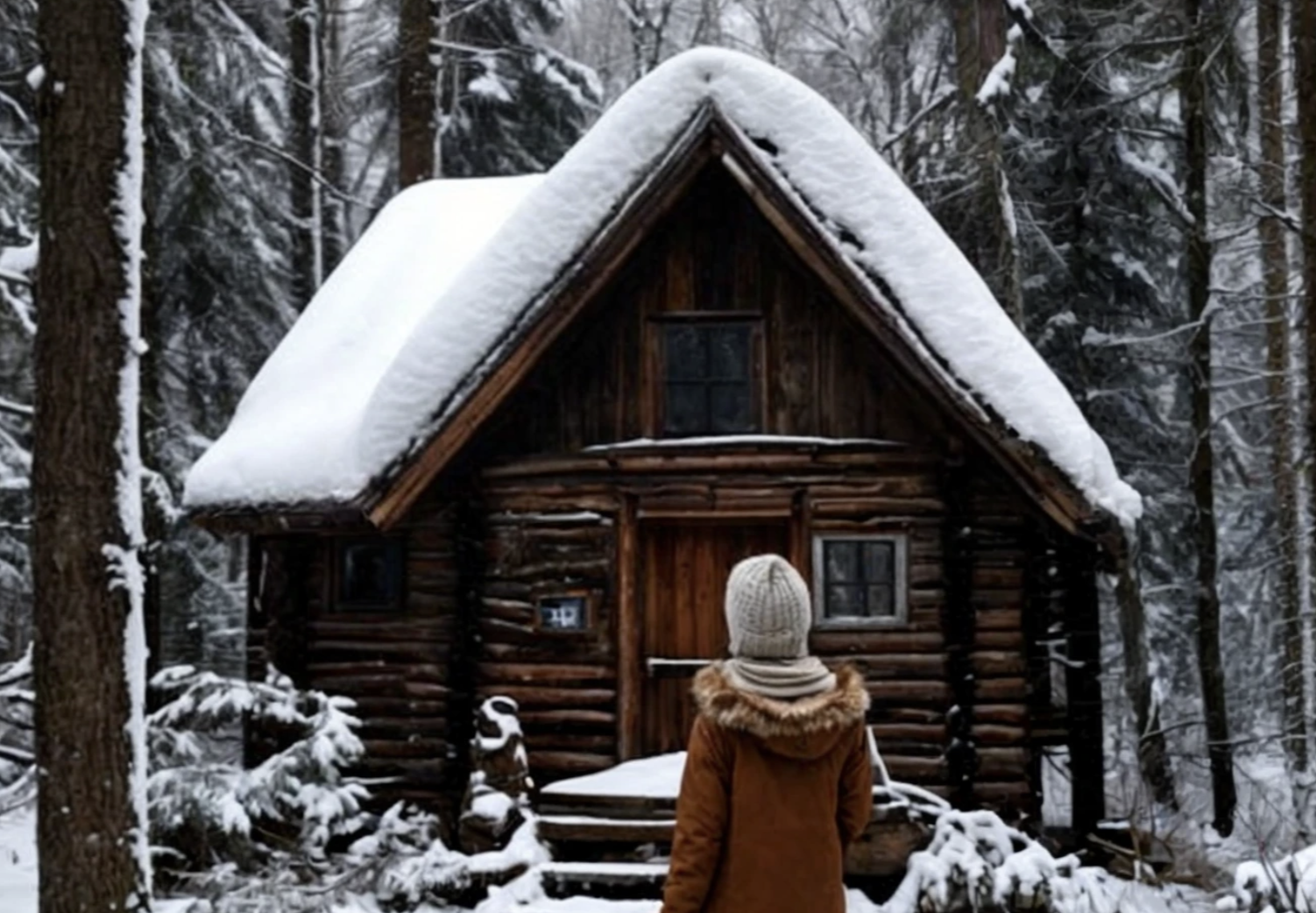The bus jerked a few times and stopped. The driver jumped off his seat and announced to the passengers:
“Ladies and gentlemen, the bus has broken down. I will contact the base and ask for another bus to be sent. For those who cannot walk, I suggest waiting here, but be warned — the heater is not working. If you can walk to the final stop, it’s better to leave now. It’s only 6 kilometers away.”
People began to complain, but a stern woman around fifty in worn clothes shouted:
“What are you yelling about? It’s clear: those who can’t walk can sit and wait. And I’m going.”
She slung her worn backpack over her shoulder and left the bus. Outside, a light snow was falling, the cold was not severe, and she briskly walked down the road.
“I should make it within an hour,” she thought, glancing at the button phone she had found at the station. “Just need to hurry, it gets dark early now.”
She quickened her pace, but then felt her back covered in sweat. “Slow down. No, this won’t do. If I sweat, I’ll freeze right away. Better to walk slowly,” she decided and moved at a normal pace.
Suddenly, a gust of cold wind pushed her aside.
“Oh no, not this,” she thought. “Just what we needed, a blizzard.”
But the snowstorm had already started. The wind quickly piled up impassable snowdrifts on the road, and Rita, that was the passenger’s name, had to step onto the shoulder where the snow was not accumulating but was blown onto the highway. She looked back at the bus, but it was already invisible behind a veil of snow.
At one point, the road turned right and was completely covered in snow. Rita could not see where to go next, so she walked at random. With each step, it became harder to walk, her feet sinking into the snow in her low boots.
Rita stopped and pondered whether to turn back or continue. Meanwhile, the snow kept falling heavily, covering everything around so that it was no longer clear where the road was or the way back to the bus.
Rita tried to remember how many times she had looked back to figure out the direction, but it was getting dark. She had to turn on the flashlight on her phone to light her way, but it only lasted a short while before going out, and Rita was once again in darkness.
“Why did I venture so far at night?” she scolded herself when suddenly she noticed some lights ahead.
“A settlement,” Rita rejoiced and gathered all her strength to push forward. Finally, she reached a small house on the edge of the village. It stood isolated, its windows shut with shutters. Rita struggled to the porch and started knocking:
“Please, open up,” she whispered, frozen, not understanding where her voice had gone.
Having lost all hope of being let in, she accidentally pressed a metal lever on the lock, and the door opened. The smell of an old hut and a cold, uninhabited air hit Rita.
“At least it’s not drafty,” the woman thought, feeling relieved, and started searching in her pocket.
She found a crushed box and struck a match. The room was small, with a stove. An old kerosene lamp stood on the table. Rita approached and tried to light it. It took a while, but when the flame finally ignited, it seemed to her that the cabin even got a bit warmer.
By the light of the lamp, she noticed a bucket next to the stove with small chips and darkened logs. She threw a few chips mixed with dry grass into it and lit them. They cheerfully blazed up, and Rita stretched her frozen fingers towards the fire.
Thank God I won’t freeze to death,” she thought.
Rita was an orphan. She spent her childhood and youth in an orphanage and a boarding school. Later, she attended a vocational school, trained as a painter-plasterer and tiler, and got married. Her husband was from the countryside, so they lived in a house with a stove for heating and an outhouse. But Rita didn’t complain.
Her husband worked as a tractor driver for a farmer, and she worked in her profession. Quite quickly, the young family saved enough money for construction and renovations, installed water in the house, and reorganized the layout. Now they had a bathroom, a separate kitchen from the living area, and steam heating on wood. They lived happily, raising their son.
Then, when their son returned from the army, Rita’s crew was invited to work in the city. She went hoping to earn some money for her son’s wedding. He said his fiancée was from the city where he had served.
However, the wedding was not meant to be. One day, Rita received a call from the local council informing her that her house had burned down and both her husband and son had died from carbon monoxide poisoning. Disbelieving the news, she rushed home but found only a pile of charred remains.
“What is this, why?” she screamed in a voice not her own, mourning the beloved men she was so proud of.
Neighbors tried to comfort the unfortunate woman, offering her a place to stay, but Rita was beside herself. Every morning she went to the cemetery and prayed at the graves until she fainted. She often required medical assistance, and the chairman offered her housing and a job, but she didn’t listen, just wandered around the ashes and ran to the cemetery. When she ate or slept, no one knew.
Eventually, unable to bear the village that reminded her of her shattered life, she went to the city. She tried to work in her field, but competition arrived—a crew of migrants under the direction of local dealers. Rita was quickly pushed out of the market, and although she got a job in municipal services, the irregular pay made it impossible to afford rent.
Then her health started to fail: she experienced shortness of breath and heart problems. Rita began to wander, begging for alms, sleeping in boiler rooms or wherever she could. The police, of course, chased her away. This went on for several years.
Once, when she and a fellow wanderer were kicked out of a station building into the cold, she decided to return to her husband’s village. They knew her there, could help. And the chairman had promised assistance. That’s how she ended up on that unfortunate bus…
When the pile of wood chips in the stove was well alight, Rita added more logs to the firebox. Live warmth flowed through the house, and she felt about to collapse. Rita looked behind the stove and saw a bed lined with old tiles.
She lay down on the warm stones, took off her jacket, and used it as a pillow, falling asleep instantly.
In the morning, a thin ray of light that had pierced the room through a crack between the closed shutters woke her. Opening her eyes, she immediately squinted from the brightness. Climbing off the bed, she dressed, as the stove had long since gone out and the house had cooled. She took half a loaf of bread and a box of juice from her backpack, snacked, and carefully collected the crumbs.
Deciding to leave the house and open the shutters, she pulled the front door toward herself and noticed fresh tracks in the snow on the porch. Approaching, she saw they were children’s tracks, likely from felt boots. Something bright red was on the step. Leaning down, she picked up a child’s knitted mitten with a snowflake pattern.
“Interesting,” Rita thought, “someone was here before I woke up.”
The tracks led behind the house, and she decided to follow them. They sank deep into the snowdrifts and led to a house but suddenly stopped. Rita looked up, confused about where to go next, and followed the tracks of a vehicle that seemed to have passed after a tractor. A few minutes later, she stood at a gate near a church. In the courtyard behind the fence stood an old bus, and the church door was ajar.
Rita decided to enter. Apparently, the church had been recently built. Inside, several bearded men were plastering the walls. She enjoyed the warmth coming from the heated floor and watched.
“Not like that, Father, like this,” one of them said to another, whose beard was even longer. The other helplessly ran a spatula over the wall, and a large piece of plaster fell to the floor.
“Ah,” exclaimed a man with a thick beard, putting the spatula back in the bucket. “No, Yuri Nikolayevich, I’m no good at plastering, my hands are all thumbs.”
“Come on, Father, don’t be so hard on yourself. I’m showing you, like this…”
But the Father had already noticed Rita entering and looked at her curiously.
She approached and asked:
“Hello. Do you know who might have lost this glove?”
Yuri shrugged, but the Father took the find and shouted upstairs:
“Liza!”
Rita looked up and saw a young woman in a white scarf standing on a wide wooden balcony right above the entrance.
“Is this ours?” the Father asked, waving the mitten.
“It looks like ours,” she replied and quickly came downstairs. Taking the mitten, she smiled. “Ah, it’s Katya’s. She ran to the abandoned house today, insisting that she saw smoke coming from its chimney last night.”
“Really!” exclaimed the priest. “And did she find anyone?”
“No, she says the shutters were closed, she didn’t see anyone, and found no tracks. Though, the blizzard could have covered them,” the woman replied, looking at Rita. “And where did you find the mitten?”
“On the porch. I ended up in that abandoned house off the highway yesterday after the bus broke down, and I thought I would freeze to death,” Rita confessed. “Lucky I found some firewood to warm up a bit.”
“And where were you heading?” asked the priest.
“To Soviy Yar,” all three said almost in unison.
“You’ve ended up in the wrong place. This is Lenskoye village, Soviy Yar is about ten kilometers away.”
Rita shrugged.
“Well, it seems fate has brought me to you.” She looked at the priest. “I’m a painter, plasterer, and tiler; I can help you with the repairs.”
“Really?” he exclaimed. “That’s wonderful because I turned out to be quite a hopeless apprentice, nothing works out for me.” He approached Rita, extending his hand. “Let’s get acquainted then. I’m the rector, Father Andrey.” He gestured to Liza. “My wife, you should call her Matushka. We really need craftsmen like you, and nobody wants to come out to our remote place.”
“Margaret,” she introduced herself and asked, “So, can I start?”
She was eager to begin working.
“Come now,” the priest extended. “You’ve just come off the road, you probably haven’t even had breakfast yet. We’ll feed you first, and then…”
He nodded to Matushka, who went into a small building next to the church, which turned out to be a dining hall. There, several smiling women were setting the table. Liza returned and invited everyone to lunch.
Rita was served a hearty fish soup with croutons, a bowl of herring under a fur coat salad next to it, a cup of hot tea, and a pie on a saucer. She had forgotten when she last had a proper meal, so she started eating carefully, trying not to pounce on the food.
Suddenly, one of the women asked:
“Rita, aren’t you from Soviy Yar?”
“Well, yes,” she replied and immediately recognized her former street neighbor. “Oh, Valechka, is that you? And how are you here?”
“Well, we don’t have a church in Soviy. So, I come here,” replied Valentina. “Remember, the chairman offered you a house? But you didn’t stay, and that house was given to a family of resettlers from a flooded area. So that’s that. Where will you live now?”
Rita shrugged and noticed that Valentina, leaning towards Matushka, whispered something into her ear. A look of astonishment appeared on Liza’s face.
“Well, we won’t find a place for a specialist to settle?” said the priest. “Even that house where you stayed last night, we’ll fix it up, throw in some firewood, and you can live there healthily.”
Rita smiled. Never before had problems seemed so easily solvable as in the company of these people.
She finally asked for the tools and to be shown where to start. The wall finishing continued, while Liza and the women quietly chanted troparia, apparently preparing for a service.
Rita was doing what she loved and felt at peace. She didn’t care how much she would be paid or where she would live. Fixing up the walls of such a beautiful church was a joy for her.
“Well, Margaret, that’s enough for now, you’ve worked hard,” said Father Yuri Nikolayevich. “Now it’s time to rest. Come to our house, we’ll have dinner.”
Rita started to refuse:
“What are you saying, how can I come to your house? Can’t you see what I look like?”
“No problem, you’re about the same size as my wife. We’ll find a robe for you and everything you need. Take a bath, sleep in warmth,” the priest stubbornly said.
When a four-year-old girl with curly hair peeking out from under her hat and laughing eyes ran into the church, Rita unexpectedly agreed. It was impossible to refuse the little girl who came up to her and said:
“Did you find my mitten? Thank you so much! I was so upset, thought I lost it on the road and that dogs would drag it away. My mom knitted them for me.”
The priest and Matushka had three biological and three adopted children who had lost their parents for various reasons.
“Sashka came to us himself,” Matushka Liza told Rita. “We noticed him at a service before Christmas five years ago. He stood in a corner, hands folded, whispering something. The grandmothers, seeing him, immediately realized he wasn’t local. After the service, they asked him about it, and it turned out he was an orphan. His mother had passed away, his father was in prison, and he was supposed to go to an orphanage. Instead, he ran away. I don’t know how he managed to make it through the snow to us. But the priest and I decided to adopt him, we found the necessary documents, and sorted everything out.” Liza smiled.
Rita sipped tea by the window, listening to her gentle voice.
“Mitya is twelve, his mother and father lost parental rights, they are alcoholics. And we noticed Vika right away when we brought gifts to the orphanage, collected by the parishioners. All the children were noisy, jumping around, but she sat quietly, deep in thought.”
Hearing her name, Vika stopped her drawing and ran up to Matushka:
“Mom, can I take my teddy bear to school tomorrow?”
“You can, but what if it gets lost? You won’t cry?”
“No, I’ll clip it to my backpack with a carabiner,” Vika said and ran off.
“And Katya has the most unusual story,” continued Liza. “A young pregnant woman came to Soviy Yar looking for her fiancé by address. She arrived at a mansion, but it was just ashes. She screamed, and then went into labor. The neighbors called an ambulance. Nobody knew where she was from, and she couldn’t speak anymore. Just before they loaded her into the ambulance, she whispered that the child was Volodya Shmelyov’s, who died in the fire. We went to see her in the maternity hospital, but sadly, the young mother didn’t survive, leaving her daughter an orphan. So we took the girl in. I had just given birth to Slavik at the time, so I nursed them together.”
Rita shuddered as if with fever, grasped one hand to her heart, and the other to Matushka’s hand.
“My God, that’s Volodya, my son’s, daughter!” she exclaimed.
“Yes, Margarita Efimovna,” confirmed Liza. “Valya told me you’re Katya’s biological grandmother. We registered her as Ekaterina Vladimirovna Shmelyova, thinking perhaps her relatives might find her.”
“Could this really be happening?” Rita sobbed. “I’ve become so accustomed to misfortune that I never expected anything good from life.”
Matushka Liza hugged the crying woman, and the approaching priest said:
“Well, Margarita Efimovna, it looks like you’ll have to settle here as Katya’s grandmother. Katya is like a daughter to us, so we’re not just going to hand her over,” he joked. “And we have enough room, the parishioners have built us such a house. You’ll live comfortably here… Children, listen to what I say,” he called out. “Today in our church, we found your grandmother Rita. Now she will live with us.”
The surprised children surrounded Margarita.
“Can you tell stories?” asked Katya.
“Granddaughter, of course,” she replied, “they read a lot of them in the orphanage.”
“So you’re from an orphanage too?” Vika and Sasha perked up. “We thought only little kids lived in orphanages.”
“I lived there too, when I was little, and then I grew up and went to work.”
“What do you do?” the children asked almost in chorus.
“I’m a painter-plasterer,” Rita replied and was surprised by the children’s reaction. They laughed merrily.
“Dad can’t plaster,” one of them said. “He complains to mom every evening that he can’t do it.”
The next day, all the children who weren’t yet in school came with the priest to the church to see Rita work. She applied plaster smoothly to the wall, leaving no wrinkles or bubbles.
The children, mesmerized by her movements, told the approaching parishioners:
“This is our grandmother; she can also paint and lay tiles. So soon, all the walls will be beautiful.”
By spring, the interior work was indeed finished, and the parishioners began preparing for Easter. A few days before the holiday, a letter arrived for Matushka Liza from Ostrogozhsk. It reported that Katya’s maternal grandfather had died and left her a house in the private sector of this small town.
The letter explained that the grandfather, upon receiving news of his daughter’s death and the birth of his granddaughter, was deeply grieved. They had parted after a serious argument, he could not forgive her for having a child out of wedlock. That was when his daughter went looking for Katya’s father. All this time, the grandfather wanted to write a will for his granddaughter but was so suspicious that he couldn’t bring himself to do such a serious deed. Only before his death did he take a solemn promise from Matushka Liza that she wouldn’t deceive him.
“There you have it,” Liza said, “our Katya now has her own house. After Easter, we’ll go see it.”
The family did indeed travel to Ostrogozhsk on the priest’s bus to accept Katya’s inheritance and rent it to good people. This trip became a bright memory in their interesting life, full of surprises and love.



